Wednesday, February 25, 2009, 10:42 - Travel, Shooting, Events
Sturovo. SlovakiaOver the weekend I went to an interesting festival (Maskarázás) in Chlaba, nearby town. As it was explained to me the purpose was to banish Winter (which we all hate don’t we?) so that our friend Spring can come along and make us happy. It seemed like a good reason to dress up in strange costumes, play with fire and drink on a Saturday morning. If you don’t believe me check it out for yourselves!

I shall scare you with my… what is that? © Damaso Reyes

Now we must jump over burning bails of hay. © Damaso Reyes

They are very hot! © Damaso Reyes

But they do not frighten me! © Damaso Reyes
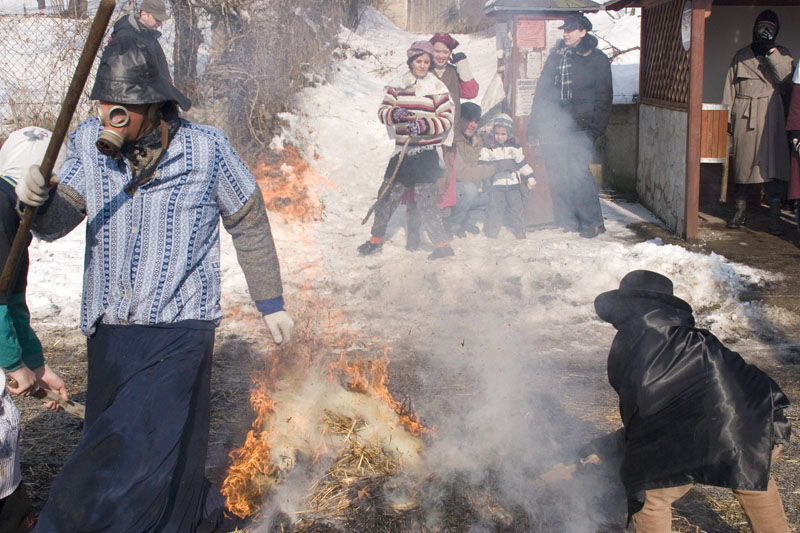
Spectacle. © Damaso Reyes

And now we dance! © Damaso Reyes
| 0 trackbacks
| 



 ( 3 / 206 )
( 3 / 206 )




 ( 3 / 206 )
( 3 / 206 )
Tuesday, February 24, 2009, 08:28 - Travel, Shooting, Personal
Esztergom, HungaryWinter has been visiting us quite a bit here in Eastern Europe. Now those who know me well understand I am not really in favor of this whole business of cold and snow but sadly until I get that villa in southern Spain I will no doubt be seeing a lot more snow. In the best spirit of adventure I recently crossed the Danube and took a little walk around. Come along for the ride!

One moment. © Damaso Reyes

Footsteps. © Damaso Reyes
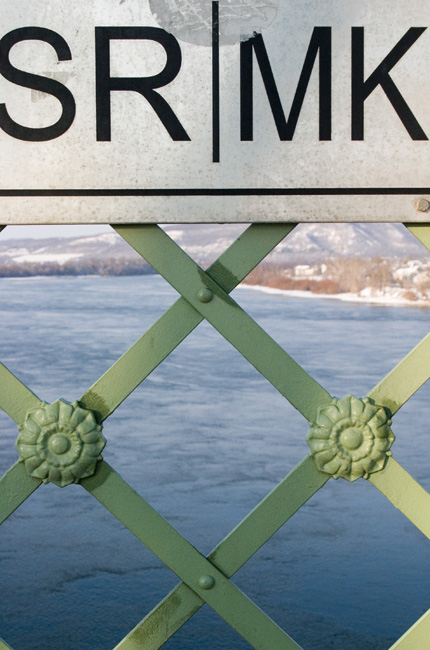
The dividing line. © Damaso Reyes

The shore. © Damaso Reyes

Trapped. © Damaso Reyes

A new path. © Damaso Reyes

Reflections. © Damaso Reyes

Sunset. © Damaso Reyes
Wasn’t that a lovely walk?
Monday, February 23, 2009, 08:30 - Commentary, Photo of the Day
Štúrovo, SlovakiaThe European Union is perhaps the most perfectly imperfect of all multinational institutions. If it were a car, it would be held together by duct tape right about now. But that is not preventing the drivers, nearly thirty at this point, from trying to drive this metaphorical car as recklessly as possible, as if they are trying to strain every rivet and bolt to see if they can be the one to send the constituent parts flying in every direction and rather unmindful of what impact that would have on themselves. We learn more from the New York Times.

The joy of politics. Vienna 2008. © Damaso Reyes
“The European Union and the European Central Bank are struggling to deal with a broad economic crisis that is affecting every European country, some feeling it far worse than others. Under the pressure of the crisis, a collective of shared sovereignties built on the idea of a common market of goods and services is being riven by statist policies and incipient protectionism.
“The eurozone itself is being strained by the desire of some countries, like France, to suspend or break budgetary rules and spend their way out of the crisis, and by the poor performance of countries like Greece, Italy and Spain, which have never cared much for the budgetary rules and can neither devalue their currencies nor alter interest rates. The Czechs, like the Germans, are much more cautious about violating European fiscal standards.
“In a time of economic crisis, we see atavistic instincts emerging,” said the Czech foreign minister, Karel Schwarzenberg, describing the way that individual nations are responding to popular distress by patriotic and protectionist measures and statements and by playing down the unity of Europe.”
I don’t know what it will take for the leaders of Europe to realize that they can accomplish far more together than they can separately. I am beginning to think that ultimately it will become what it has always been, a process of osmosis, slow and steady. I had believed that the E.U. had reached something of a critical mass but increasingly I think that further integration is something which must happen at the lowest levels possible, namely between people because the politicians are too invested in their own power, however limited it may be, to give any of it up any time soon…
Thursday, February 19, 2009, 11:40 - Commentary, Photo of the Day
Sturovo, SlovakiaKosovo just celebrated its first independence day this week. The country has come a long way in the past year but there are still many hurdles not least of which is the fact that most nations in the world, including several members of the European Union, do not yet recognize Kosovo as an independent state. We learn more from the International Herald Tribune as well as from the Economist.
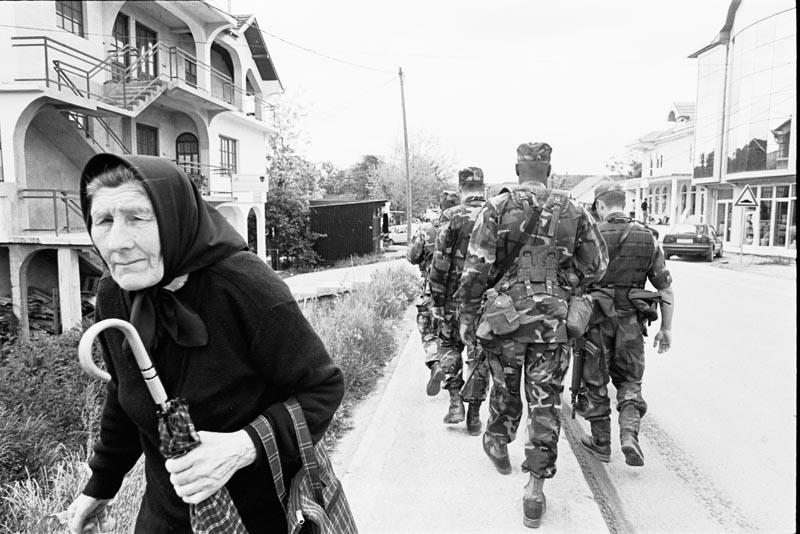
An uncertain future. Kosovo 2005 © Damaso Reyes
“Jubilant ethnic Albanians poured into the streets Tuesday to celebrate the first anniversary of Kosovo's independence from Serbia, as nationalist Serbian lawmakers joined their ethnic kin in northern Kosovo to try to undermine the tiny country.
“The twin moves highlighted the division that has plagued Kosovo and threatens to split it along ethnic lines. It also underscored the challenge Kosovo's authorities face in asserting control over areas where Serbs live."
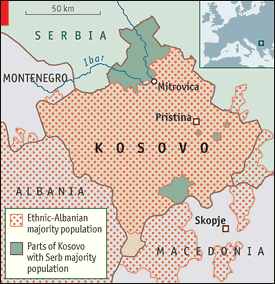
The Economist states:
“The bad news is that Kosovo remains poor and its administration weak. Serbia’s government has led a highly effective diplomatic campaign against it and Kosovo has a bad image abroad. Yet it is often unfairly singled out for blame. It lies on a main drug-trafficking route, for instance; but so do some EU members, such as Bulgaria and even Austria.
“It is widely believed that Albanians, including Kosovars, play an inordinately large role in Europe’s drug cartels, but research does not often bear this out. According to a report by the Kosovar Stability Initiative, a think-tank, in 2006 only 6% of those arrested for heroin smuggling in Italy were ethnic Albanians; 65% were Italians and 19% were north Africans. Some stereotypes widely believed and repeated about Kosovars abroad are merely racist.
“So are Kosovars downcast? Far from it. A recent survey by the European Fund for the Balkans and Gallup found that, among seven western Balkan countries, Kosovo’s people are the most satisfied. They will certainly enjoy their birthday.”
Kosovo was, and still is, an important test for the European Union. The simple fact that not all E.U. members have recognized Kosovo is a prime example of the dysfunction that E.U. foreign policy is beset by. How the E.U. managed, or mismanaged Kosovo’s move towards independence highlights the need for a common foreign policy, or at least one that members can agree on. Until member states realize they can accomplish more on the global stage as a group than they can independently the status quo will likely remain…
Wednesday, February 18, 2009, 08:05 - Commentary, Photo of the Day
Sturovo, SlovakiaWhen a young child jumps up and down and screams do you:
A.) ignore the child
B.) hit the child
C.) try to calmly reason with the child
Well the saga of Geert Wilders, a Dutch right-wing politician continues. He was recently banned from entering the United Kingdom even though he was invited by members of parliament. We learn so much more about the sorry incident from Der Spiegel and The Guardian.
“He was refused entry … anybody who is refused entry to the UK will be detained and returned," a Home Office spokesperson told the French news agency AFP. "The government opposes extremism in all its forms. It will stop those who want to spread extremism, hatred and violent messages in our communities from coming to our country."
The Dutch politician had vowed to defy the Home Office's order to bar him from the country so that he could present his film "Fitna" in the House of the Lords, where he had been invited to show it. In its letter earlier this week, the Home Office claimed Wilders' visit would pose a "genuine, present and sufficiently serious threat to one of the fundamental interests of society. … Your statements about Muslims and their beliefs, as expressed in your film 'Fitna' and elsewhere, would threaten community harmony and therefore public security." The ban is a blanket one that Britain claims has been applied using EU laws that allow member states to exclude entry to anyone whose presence could threaten public security,” Der Spiegel writes.
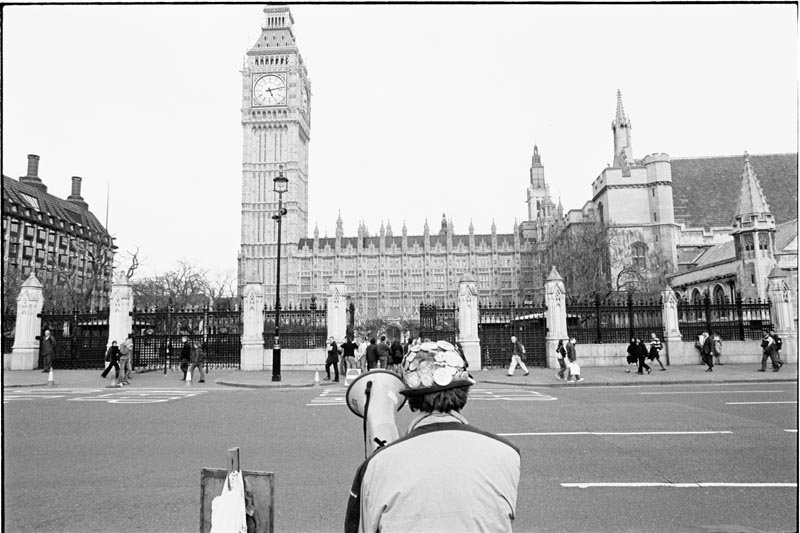
Fight for your right to protest! London 2005 © Damaso Reyes
“The National Secular Society president, Terry Sanderson, said he wrote to the home secretary, Jacqui Smith, saying she should not have denied an application by a "democratically elected politician from a sovereign state who wants to come and express an opinion".
"It may be a controversial opinion but he is entitled to express it," he said.
“The Home Office has said it would "stop those who want to spread extremism, hatred and violent messages in our communities from coming to our country.
“The Liberal Democrat home affairs spokesman, Chris Huhne, said that while it was important to defend freedom of speech, Wilders "has overstepped the line that should be defended in a civilised society," The Guardian tells us.
That last statement is the one I have the biggest problem with. Who should have the right to say where the line is in a civilized society? Once the government has that power all sorts of unpopular things, people, ideas get banned. More importantly society misses out on having a sincere debate on important issues. Wilders and his ideas will not go away simply because he was turned away at the airport. If anything this silly incident has give him and his viewpoint far more attention than it otherwise would have had. Like it or not he is the democratically elected representative of his district and if Obama can say that America should reach out to Iran and North Korea why can’t the U.K. engage with someone like Wilders?
Is British democracy so fragile that it cannot withstand ideas it finds unpalatable?
Tuesday, February 17, 2009, 08:28 - Project News
Sturovo, SlovakiaJust a quick update to let you know that one of my images is now being featured on Kodak’s homepage for professional photographers! When you have a chance, stop by and check it out…

Kosovo 2005 © Damaso Reyes
Monday, February 16, 2009, 08:54 - Shooting, Events, Commentary
Štúrovo, SlovakiaOn Friday I went to the annual dance that the local high school puts on for its students. What was remarkable is how unremarkable it was. Girls were all dressed up and had their hair done; the boys looks uncomfortable in their suits and tuxedos. They danced to bad music and had a good time. The scene could have been in Berlin or Brooklyn for that matter, which is very much the point.
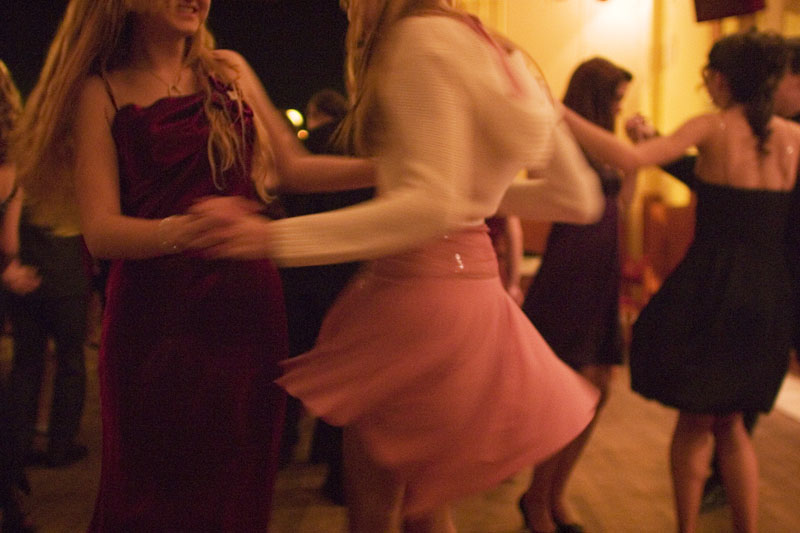
Swinging and swaying… © Damaso Reyes

Watching and waiting. © Damaso Reyes

Music Playing… © Damaso Reyes
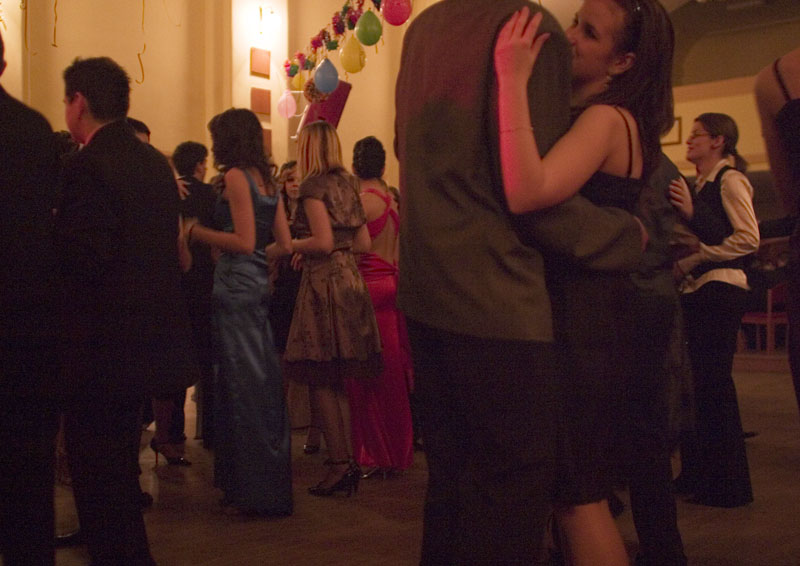
Hoping… © Damaso Reyes

In the moment. © Damaso Reyes
I’ve also visited the school twice to talk to students about my work. For me what’s interesting is how they view themselves and their lives, which is to say very much like their Western European counterparts. All of them have mobile phones and computers and plan on attending university. They shop online and listen to American pop music. Just twenty years ago this of course wasn’t the case. The entry of Slovakia into the European Union no doubt accelerated this trend.

The future is now. © Damaso Reyes
Friday, February 13, 2009, 08:51 - Commentary, Photo of the Day
Štúrovo, SlovakiaI thought I would end the week on a positive note, or at least as positive as I can manage given the state of the world at the moment. A new government has been formed in the storm battered nation of Iceland. At its head is Prime Minister Johanna Sigurdardottir, whom we learn more about from the International Herald Tribune.

Let the games begin! Stuttgart 2007 © Damaso Reyes
“Sigurdardottir, 66, is a former flight attendant and union organizer, and served as social affairs minister in the previous government.
“She is Iceland's first female prime minister, and her Cabinet is the country's first to be split evenly between men and women.
“Sigurdardottir also is the first openly gay national leader of modern times, apart from Per-Kristian Foss, a Norwegian politician who briefly served as his country's prime minister in 2002.”
Progress comes in many shapes and forms. In America, the election of Barack Obama is one such example; another is the fact that we have had two female Secretaries of States in a row, the current one would likely have been president if Obama had not won the nomination. It seems like more and more we are heading towards a world where the circumstances of one’s birth will not limit one’s opportunities. But as we all know a world where that is fully realized is still some time away.
Thursday, February 12, 2009, 08:54 - Commentary, Photo of the Day
Štúrovo, SlovakiaLife in Europe is very much dominated by history. Be it the monuments to those lost in war or the traditions which have been passed along down the centuries history is ever with us here. An interesting article from Der Spiegel in Germany talks about some recent history.
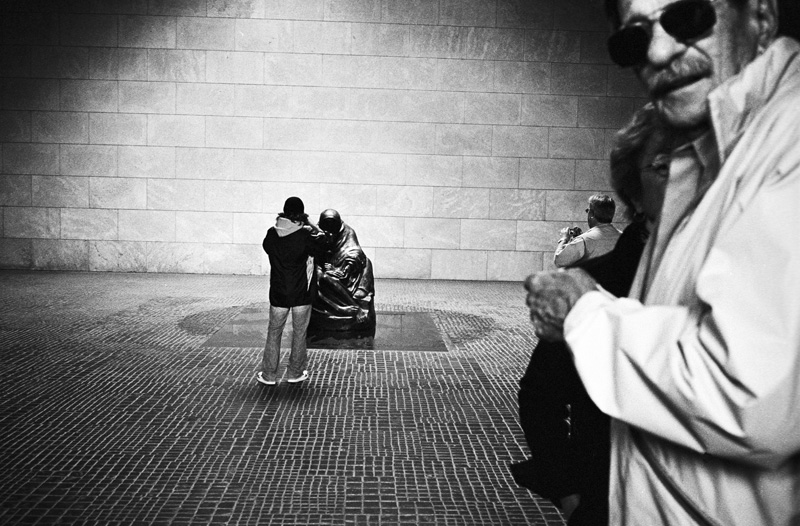
Monument to the dead. Berlin 2007 © Damaso Reyes
“Chris Gueffroy died in February, 1989 while trying to flee across the Berlin Wall. He was the last East German citizen to fall victim to the state's policy of shooting escapees in the divided city.
“Berlin paid tribute Thursday to the last person shot trying to cross the Berlin Wall. Chris Gueffroy died in a hail of bullets as he tried to flee East Germany on the night of Feb. 5-6, 1989. He was the last person to fall victim to the East German policy of shooting people trying to flee across the Berlin Wall -- although more were to die trying to escape from East Germany before the borders were opened on Nov. 9, 1989.”
If that wall had not come down I would likely not be writing from Slovakia right now. I remember growing up it was hard to imagine a world where there wasn’t a Soviet Union and today several Warsaw Pact nations are now part of the E.U., that most capitalist of institutions. They also have a common currency, something they didn’t even have under the Soviets!
But it is also important to remember those who made the sacrifices for the freedoms we enjoy. Though it is hard for people of my generation and those younger than I to understand the walls that once divided us we know all too well about the cultural and economic ones that still exist.
Wednesday, February 11, 2009, 07:01 - Commentary, Photo of the Day
Štúrovo, SlovakiaEurope needs a constitution. And it certainly needs a first amendment as we learn in an article from the New York Times.
“Four executives of Google begin trial Tuesday in Milan on criminal charges of defamation and privacy violation in regard to a video posted on Google’s Italian site.
“The case involves a three-minute cellphone video, posted in 2006 to Google Video, in which four youths in Turin tease a boy with Down syndrome. After an Italian advocacy group complained that the video was objectionable, Google quickly removed it from the site. Prosecutors argue that the video should not have been published at all.”
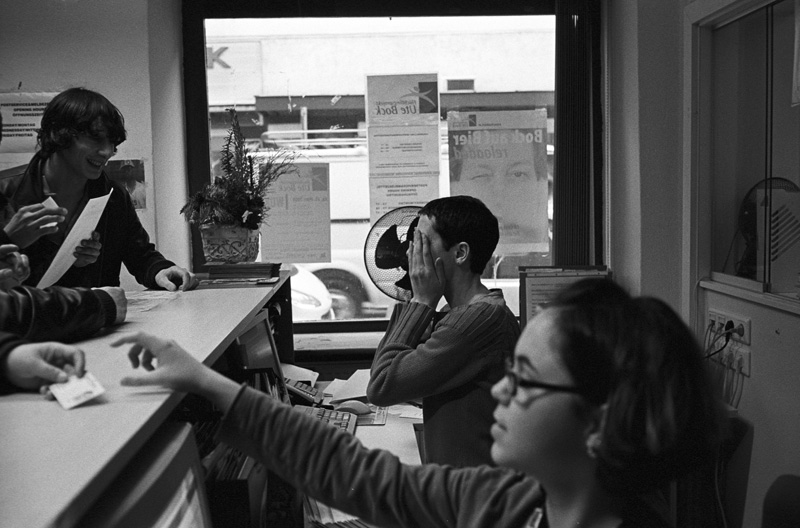
Stop, my head is hurting! Vienna 2008 © Damaso Reyes
First I think if we want to live in a society where there is a free exchange of ideas we have to be willing to be offended. Second, when we start putting restrictions on speech, whether it is something odious like denying the Holocaust or disturbing like the case above, we start down a very slippery slope. Why should an Italian court decide what goes on Google Video? More importantly will they be able to control content that is not made or hosted in Italy but can be seen by Italians? You begin to see the enormous challenges that we face when we start to regulate speech.
Banning political parties and books and speech is a tradition in Europe, one that modern democracies can do without. We can object to and argue against speech and ideas we find repulsive without banning them. Once the government begins to do that it won’t be long until we are living in Oceania...
Tuesday, February 10, 2009, 12:49 - Travel, Shooting
Štúrovo, SlovakiaSo last weekend was not just about dancing, let me tell you! I also got to do some relaxing, which in this part of the world invariably involves drinking, and lots of it. Well, when in Hungary, do as the Hungarians do, I always say!

Opening the taps! © Damaso Reyes
My friend Almos invited me to his hometown where his father makes his own wine, as well as Palinka, a local liquor which is very smooth even if it has an alcohol content “above 50%” as I was informed.
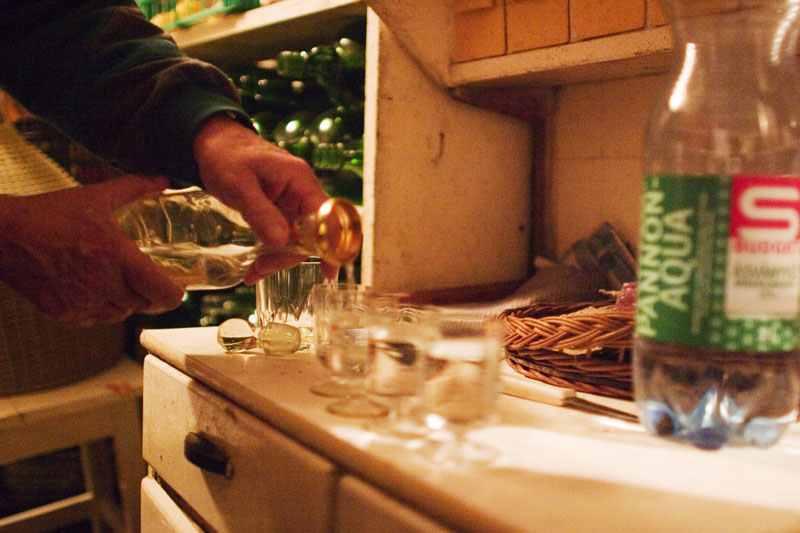
This ain’t just water! © Damaso Reyes
It seems like having a wine cellar is as much of a Hungarian tradition as having a backyard is in America. From what I was told making alcohol is the local pastime, one I can enthusiastically support.
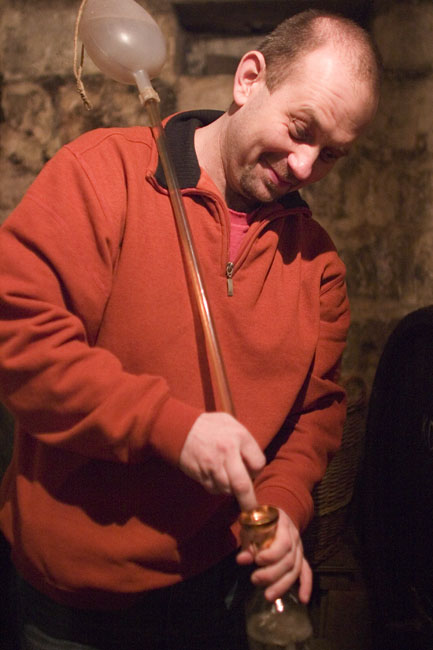
Almos pours out a taste. © Damaso Reyes
I have to say that the wine was excellent, as it should be since it has won several local awards. And the Palinka was even better. Of course I can only sip a little at a time, after all, I would like to keep my insides intact, but it was exceedingly smooth and had a lovely subtle fruit flavor.

All in good fun. © Damaso Reyes
What I like about drinking in Europe, and in Hungary in particular, is that it is a family affair. That is to say that it isn’t stigmatized the way it is in America and children grow up understanding it is a part of life, rather than having adults try to hide it from them. This is a much healthier attitude.

Mmmmmm? © Damaso Reyes
Of course when you drink you must eat, another good thing about the European perspective. Of course when you are a stranger in a strange land you will sometimes encounter new things, as I did…

Mmmmmm! © Damaso Reyes
But fun was certainly had by all!
Tuesday, February 10, 2009, 08:47 - Commentary, Photo of the Day
Štúrovo, SlovakiaWhat’s truly ironic is that if America had treated the huge wave of 19th century Italian immigrants they way Rome is, and has proposed treating the African migrants who come to its shores every day I doubt there would be a pizza shop in Brooklyn. Italians, along with the other immigrants who came to America seeking opportunity have contributed far more than they have taken. What is to say that African immigrants won’t do the same? As we learn from Der Spiegel, yet another controversy has erupted around the Italian policy towards immigrants.
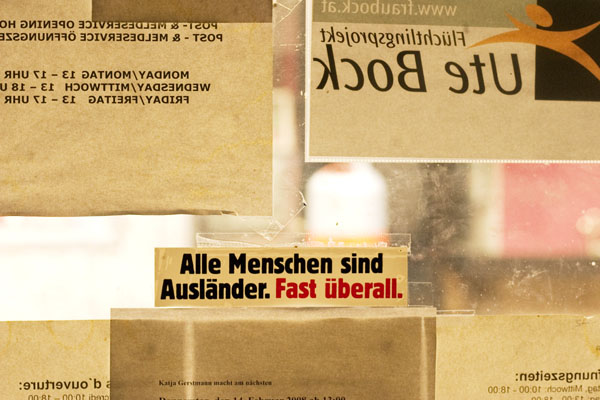
If only they could read German. Vienna 2008 © Damaso Reyes
“Under Rome's proposed new policy, refugees will no longer be transported directly to the mainland, but will be held in camps on the island instead. Lampedusa is ideal for this purpose. No one can leave without a boat, and a stranger would have trouble hiding for more than a few minutes in the single town on the island. The Africans shall be deported to some other country, eventually -- but it will be difficult, and it will take time.
“The 6,000 Italians living on Lampedusa have spent the last two weeks rioting and striking to protest the government's plans for their island. They are worried that the detention center could harm tourism, one of the mainstays of the local economy. After all, who books a vacation in Guantanamo? Some fear that thousands of refugees will converge on Lampedusa, and that the entire operation will be bigger than the Americans' notorious detainee camp.”
Clearly any policy that can be readily compared to the Guantanamo is not well thought out. Of course one could say that bringing back the current prime minister might not have been the best move either (a better argument for term limits cannot be found). It seems that even Italians are becoming tired of the xenophobic and reactionary policy their government is taking. Whether that will be enough remains to be seen…
Monday, February 9, 2009, 12:40 - Travel, Shooting
BudapestI don’t know about you but I had a pretty busy weekend! There’s so many photos to share that I will have to break it up into two posts. On Friday I went with some friends to Budapest to take in some traditional Hungarian folk dancing.
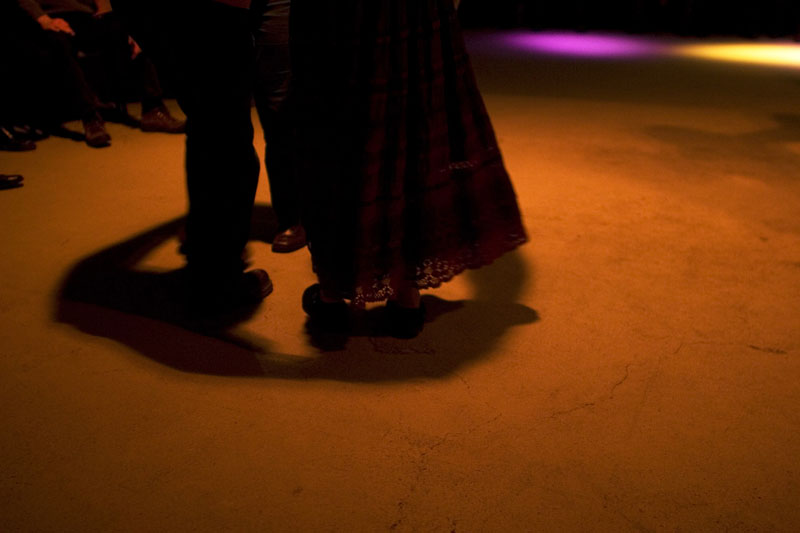
One moment. © Damaso Reyes
The music may have been traditional, but the crowd was mostly young people in jeans and dresses.
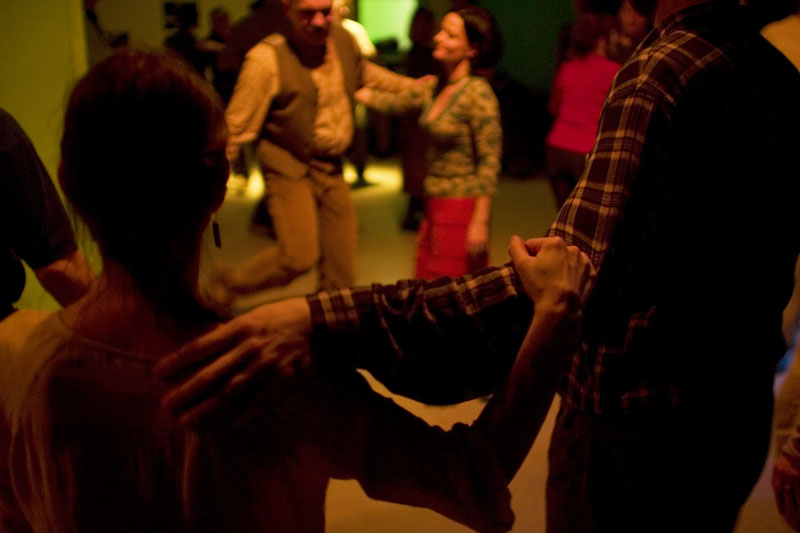
All together now. © Damaso Reyes
From what I was told traditional music and dancing was discouraged under Communism. Today there has been something of a renaissance of all things Hungarian.
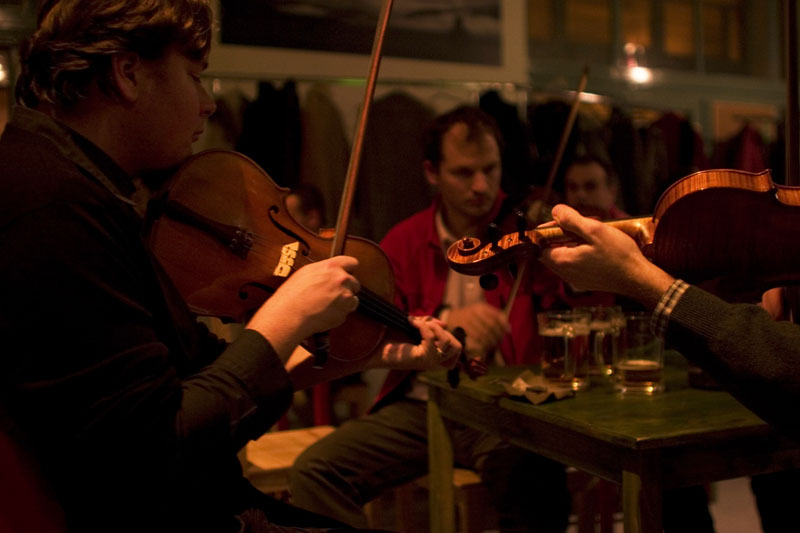
Trio. © Damaso Reyes
I can’t tell you how nice it is to hear. Whenever I go into a supermarket, or any public space that has music, I am assaulted by American pop music. If I wanted to listen to Britney Spears I would have stayed in the United States. But here it was nothing but the sweet melodies of the violin that filled the room.
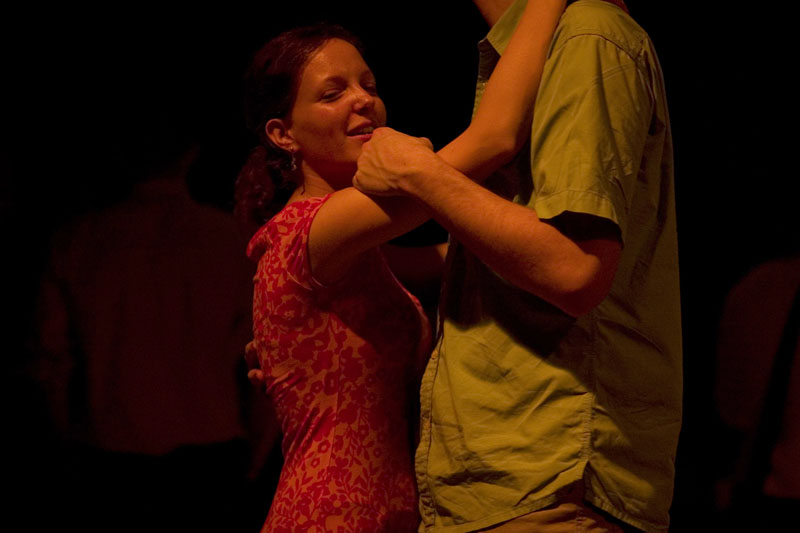
Slowly. © Damaso Reyes
For sure American and Western European influences abound, especially among the youth. But there is an intense pride in the Hungarian identity that is not chauvinistic but proud.
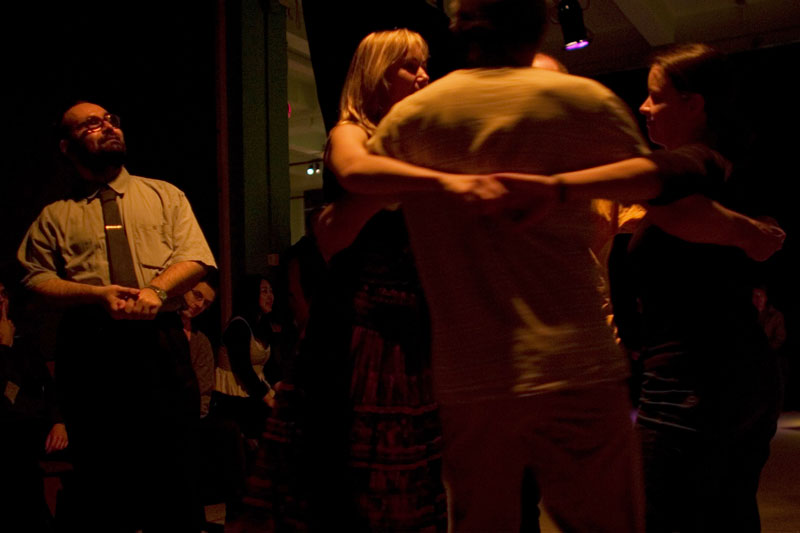
Watching and waiting. © Damaso Reyes
I recorded some music and will hopefully put together some kind of slideshow later in the week. It’s hard to get across the feeling without hearing the music which inspires the dancing.

Smile. © Damaso Reyes
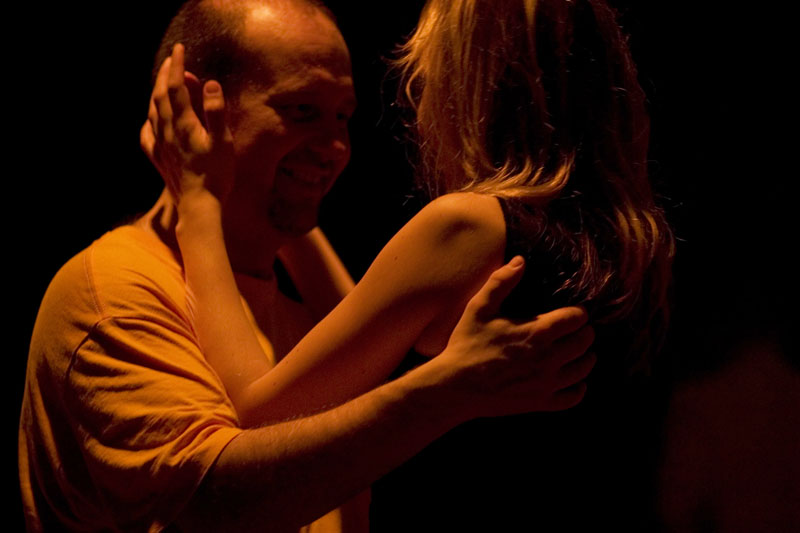
Embrace. © Damaso Reyes
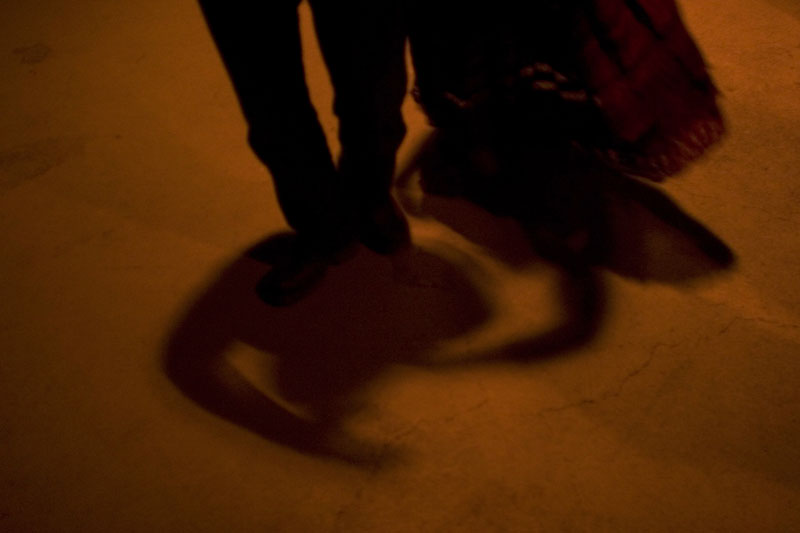
Circle. © Damaso Reyes

Pair. © Damaso Reyes
Monday, February 9, 2009, 10:33 - Commentary, Photo of the Day
Štúrovo, Slovakia“Davide Boni, a councillor in Milan for the Northern League, which also opposes the building of mosques in Italian cities, said that kebab shop owners were prepared to work long hours, which was unfair competition.”
This is just one paragraph from a great article in the Telegraph. It seems that some right wing politicians have decided that the “invasion” of foreign food in Italy must be stopped at all costs.

First food then people. Vienna 2008 © Damaso Reyes
“The tomato comes from Peru and spaghetti was probably a gift from China.
It is, though, the “foreign” kebab that is being kicked out of Italian cities as it becomes the target of a campaign against ethnic food, backed by the centre-right Government of Silvio Berlusconi.
“The drive to make Italians eat Italian, which was described by the Left and leading chefs as gastronomic racism, began in the town of Lucca this week, where the council banned any new ethnic food outlets from opening within the ancient city walls.
“Yesterday it spread to Lombardy and its regional capital, Milan, which is also run by the centre Right. The anti-immigrant Northern League party brought in the restrictions “to protect local specialties from the growing popularity of ethnic cuisines.”
Not only is this nonsense, it is offensive. If the only way your culture can survive is to diminish others then what you seek to protect is not long for this world. First, kebabs are yummy, as anyone who has had one can attest. Second, it is doubtful that Italians will ever stop eating pasts. This move is simply an attempt to stoke divisiveness, one that most Italians will see through.
But of course it is still a worrying phenomenon. I can only hope that Italian politicians will stop focusing on these petty issues and begin to address themselves to the economic issues which are crippling the nation. The quote at the top of this entry is a perfect example of the backwardness that some, even elected officials, still cling to. In America the “hardworking immigrant” is an ideal that we hold in esteem. Clearly some Italians seem to think working hard and long hours is a bad thing, which is probably why the country is in the shape that it is in. If Italian politicians keep this up people will no longer refrain from laughing behind their back but do it to their faces!
Friday, February 6, 2009, 08:23 - Commentary, Photo of the Day
Štúrovo, SlovakiaIt looks like the economic downturn will give the protectionists in the U.K. we spoke about earlier in the week exactly what they want, as we read in The Guardian.

Guess he won’t be coming to London after all. Cologne 2007 © Damaso Reyes
“The use of migrant labour in Britain will decline abruptly as companies face a sharp fall in demand for their goods and services, the Confederation of British Industry told MPs yesterday. John Cridland, the CBI's deputy director general, told the Commons home affairs committee that the first response of many firms to the downturn was to reduce their dependency on agency staff, many of whom are migrant workers.
“He said that there was evidence that many nationals of new EU states were going home as unemployment rose in Britain and suggested that the flow of skilled migrants from outside Europe would also decline. He added: "I expect that, when we have the next report from the [Home Office's] migration advisory committee on the needs for skilled labour, we will not see the same need for non-EU labour in the same numbers because of the need to provide as many employment opportunities as possible for the unemployed. All I'm suggesting is that the market will correct itself, but what we cannot avoid is a significant increase in unemployment, which is a sad but inevitable consequence of recession."
And where will that leave British workers and consumers? It’s doubtful that they will be much better off than they were before, after all, if Pawel from Lodz won’t come and work will Tom from Coventry all of a sudden be gainfully employed? Doubtful I think. More importantly the money these migrant workers were adding to the economy and the taxes they were paying will likely be lost. Many of these workers are being laid off and fired, meaning those jobs just don’t exist. More importantly will Brits be willing to work for the wages that even immigrants won’t? Also doubtful I think…
Back Next

 Calendar
Calendar




